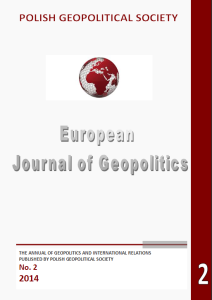Language, identity and boundary disputes in the emerging virtual state: challenges from the Internet, Google and social media worlds
Language, identity and boundary disputes in the emerging virtual state: challenges from the Internet, Google and social media worlds
Author(s): Stanley D. BrunnSubject(s): Politics / Political Sciences, Politics, Political Theory, Communication studies
Published by: Polskie Towarzystwo Geopolityczne
Keywords: virtuality; state; Internet; social media; cyberstate
Summary/Abstract: Traditional themes of our study of the state, including cores, peripheries, boundaries, national identities, treaties and laws are important in our understanding of the virtual or cyberstate. These fluid, three and four-dimensional worlds, associated with speed, networks and the compression of tie and space, call for a renewed focus on contemporary topics facing a polycentric, internet- connected, visually-oriented and social media world. I address seven major themes that challenge virtual state leaders; the political and legal status of their residents, immigration and citizenship, minority group rights, transnational identities, language nationalism, the emergence of visual geopolitics, and the resolution of cyberstate conflicts. I close with suggesting some innovative maps that illustrate the distinctive features of his emerging virtual state world.
Journal: European Journal of Geopolitics
- Issue Year: 2014
- Issue No: 2
- Page Range: 24-43
- Page Count: 20
- Language: English

